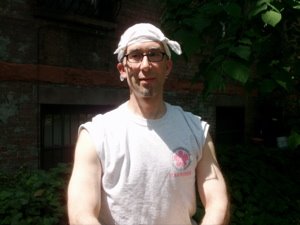Brokeback Ocean

Zen teachers caution us not to follow the example of the man whose sword fell overboard and who put a notch in the side of the boat to mark the place, so that he could come back and find it later. Turning our minds towards getting back to some special experience probably means that we are ignoring actual life. The boat is still moving, and the ocean never stops.
Annie Proulx ends the story "Brokeback Mountain" this way:
"There was some open space between what he [Ennis] knew and what he tried to believe, but nothing could be done about it, and if you can't fix it, you've got to stand it."
It took quite a few years for the Jack Twist in me to see this "open space" as anything other than a problem to be solved. I tried to solve it many times. I think many "queer" people do. Especially if we believe that our love will seldom find expression (and in some times and places there has been little reason to think otherwise), we may notch the boat at our first experience of love's recognition, and try our best to return to that place, to construct our lives around the possibility of returning.
Maybe those attempts succeed for a while (probably not forever) or maybe they don't ever succeed again, but in either case, we are likely to become more and more frustrated as we realize that we can't return to Brokeback (or Brideshead, or wherever). But maybe after many failures we can sit still long enough to recognize that the "open space" is not a problem at all. It is indeed the very space in which we live out our life. The fact that we won't return to the same experience is surely the reality of our life, but the event we can't let go of is not really separate from our life, nor does it define our life. That space between what our bodies know and what our minds try to believe is the only place human life can take place. The Ennis Del Mar in us can honor the experience without being tied up in it.
Hmm... what is of the sea (Del Mar) keeps moving, and does not Twist in bonds to that one event. I know, I know, it was a beautiful, life-illuminating moment. But is it really separate from the rest of your life?
As Jack thinks to himself in the story: Let be, let be.


